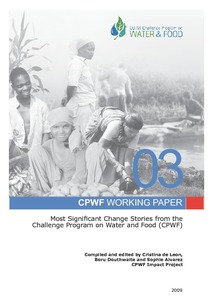Resource information
The following stories were collected from CPWF project and theme leaders in two rounds. The first round of stories were collected in January 2007 based on the following two questions:
What has been the most significant technical development or advance made by your 1) CPWF project / theme / basin since the start?
What has been the most significant partnership change (significant in terms of making 2) scientific progress and/or developmental impact more likely) that has taken place since the start of your CPWF project (or theme or basin)?
In June 2009 we repeated the process asking the same basic question, without specifying between technical and partnership changes. We asked for photographs and references to documents that substantiate the stories. We collected 54 stories in Round 1, and 15 in Round 2. A selection of 44 stories are presented here. Those we left out we did so if the stories they told were not clear, if they did not follow the format, or if we did not receive answers to clarifying questions.
T
he stories are organized by the CPWF’s five themes and according to First Call projects, Basin Focal Projects and Small Grants projects. They show the broad range of outcomes and impacts that the CPWF is beginning to have. The stories are not a comprehensive audit of CPWF impact, but rather what people felt motivated to write about. The stories provide gateways to evidence of change, and are not to be interpreted as definitive but as iterative. Indeed, some projects presented change stories in both rounds.
CPWF Theme Leaders selected the first round story or stories they thought most significant and gave their reasons. The selection decisions and criteria are given as feedback to the projects as a way for the CPWF to focus innovation towards explicitly valued directions and away from less valued ones. One story was selected as the most significant from the second round stories.
T
he Most Significant Change (MSC) method was used to collect and analyze the stories1. MSC is part of a repertoire of iterative learning-based approaches that are employed by the CPWF and its projects in response to emergent change. The authors of the stories are principally the program’s Theme Leaders, Project Leaders and Principle Investigators. In writing the stories they were able to give their interpretation of the emerging issues and changes that most mattered to the leadership in these projects.


